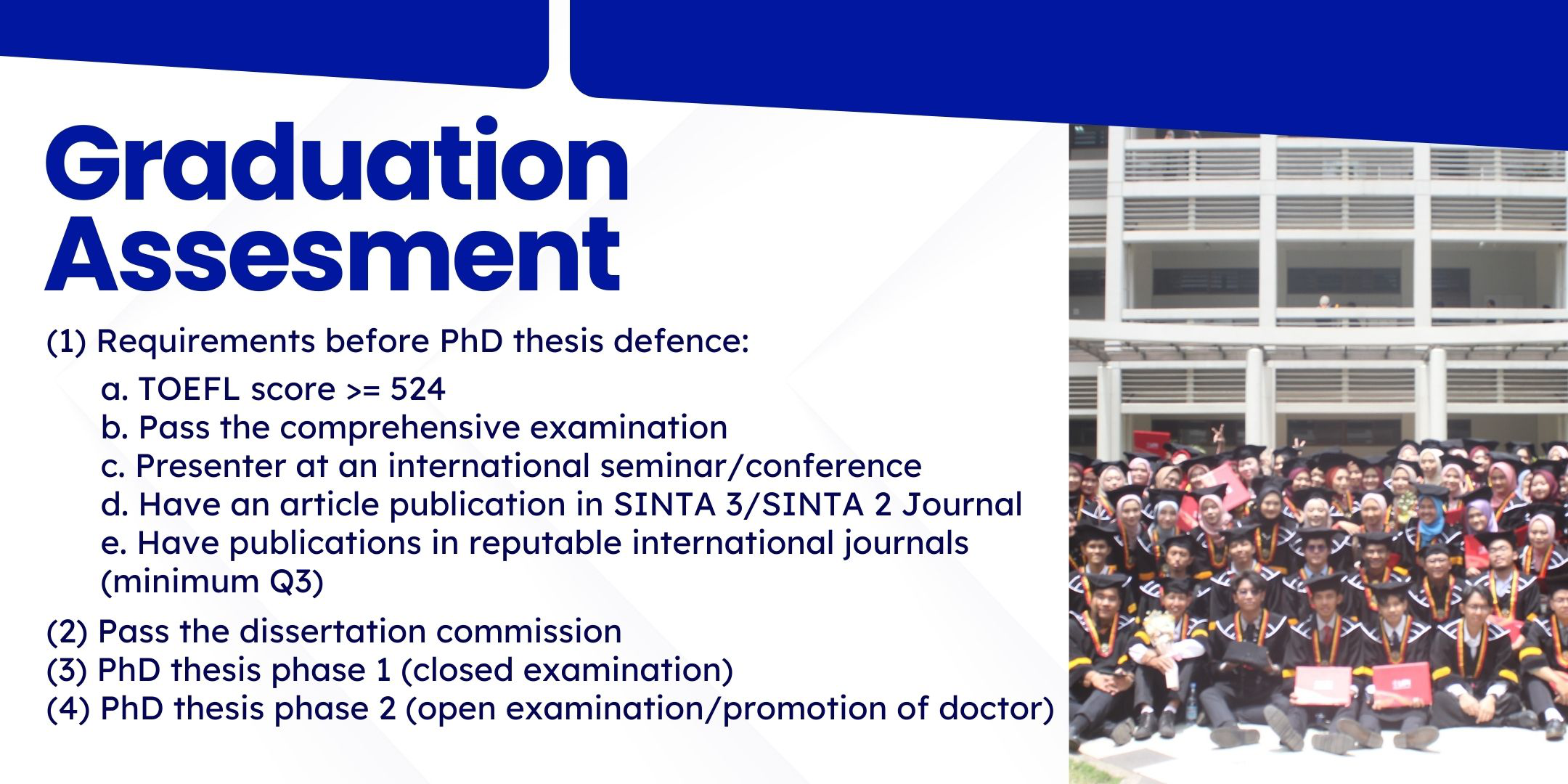- Objectives
- Degree of Study Program
- Curriculum Development Study
- Graduate Profile
- Learning Outcomes
- Assesment
- Curriculum Structure
- Distribution Curriculum Structure
- Curriculum Mapping
1. Objectives
Program Education Objective (PEO) of Doctoral Program of Mathematics Education
- PEO-1 : Graduates can contribute to the development of Mathematics Education through the scientific research process published in either national or international reputable journals.
- PEO-2 : Graduates have in-depth competence in the field of Mathematics Education to carry out their duties as lecturers, researchers, and experts in the field of mathematics education both at the secondary and higher education levels
- PEO-3 : Graduates become mathematics education researchers who master knowledge, skills, reasoning, and problem-solving to problems faced in the scientific community and the general public
- PEO-4 : Graduates can become pioneers or pioneers in creating innovations in the field of mathematics education and can solve various relevant problems in the field of mathematics education both at the local, national, regional, and international levels.
- PEO-5 : Graduates can see opportunities and create jobs, and entrepreneurship, whether in the field of education, other relevant fields, or other fields
2. Degree of Study Program
The degree for graduates of the Doctoral Program of Mathematics Education is “Dr.” Number of ECTS credits:
- Curriculum 2018
67.5 ECTS for students in the same field and
85.5 ECTS for students outside the field
- Curriculum 2024
82.5 ECTS for students in the same field and
93 ECTS for students outside the field
3. Curricullum Development study

4. Graduate Profile

5. Learning Outcomes
European Qualification Framework (EQF), Indonesian National Qualification Framework (IQF), Intended Learning Outcomes (ILO) of Doctoral Program of Mathematics Education
| EQF | IQF | ILO DP-ME |
|---|---|---|
| Knowledge and Understanding | ||
| Knowledge at the most advanced frontier of a field of work or study and at the interface between fields | Capable of developing new knowledge, technology, and/or arts in their discipline or professional practice through research in order to produce a creative, original, and tested work |
|
| Skills | ||
| The most advanced and specialized skills and techniques, including synthesis and evaluation, are required to solve critical problems in research and/or innovation and to extend and redefine existing knowledge or professional practice | Capable of solving a problem in science, technology, and/or arts in their discipline through an inter, multi, and transdisciplinary approach |
|
| Autonomy and Responsibility | ||
| Demonstrate substantial authority, innovation, autonomy, scholarly and professional integrity and sustained commitment to the development of new ideas or processes at the forefront of work or study context, including research | Capable of managing, leading, and developing research and development that benefits humanities and can obtain national and international recognition |
|
6. Assesment

7. Curriculum Structure
Linear Development of Study Program Skills (PLKP)
| Code | Courses | Credits | Semester |
|---|---|---|---|
| MT761 | MATHEMATICS LEARNING STRATEGIES AND LESSON PLANNING | 3 | 1 |
| MT756 | THEORY AND PRACTICE OF DEVELOPING TECHNOLOGY BASED MATHEMATICS LEARNING MEDIA | 4 | 1 |
| MT758 | ANALYSIS OF MATHEMATICS EDUCATION RESEARCH DATA | 4 | 1 |
| MT770 | COGNITIVE DEVELOPMENT PSYCHOLOGY IN MATHEMATICS LEARNING | 3 | 2 |
| MT760 | MATHEMATICS FOR HIGHER EDUCATION | 4 | 2 |
Academic Skills Development (PKA)
| Code | Courses | Credits | Semester |
|---|---|---|---|
| KA800 | PHILOSOPHY OF EDUCATION | 2 | 1 |
| KA801 | CORE STUDY OF SCIENCES | 3 | 1 |
| KA802 | RESEARCH STATISTICS | 3 | 1 |
| KA803 | PUBLICATION STRATEGY FOR REPUTABLE JOURNALS | 2 | 1 |
| KA806 | ADVANCED RESEARCH DESIGN | 3 | 1 |
| KA812 | RESEARCH PROTOCOL DEVELOPMENT | 6 | 4 |
Development of Expertise in the Field of Science (PKBI)
7. Distribution Curriculum Structure
Distribution Curriculum Structure per Semester in Curriculum 2018 of Doctoral Program of Mathematics Education
| Doctoral Program of Mathematics Education | ||||
|---|---|---|---|---|
| Semester | Credits | ECTS Credit Points | ||
| Students from Same Field | Students from Outside the Field | Students from Same Field | Students from Outside the Field | |
| I | 10 | 13 | 15 | 19.5 |
| II | 8 | 11 | 12 | 16.5 |
| III | 6 | 9 | 9 | 13.5 |
| IV | 3 | 6 | 4.5 | 9 |
| V | 3 | 3 | 4.5 | 4.5 |
| VI | 15 | 15 | 22.5 | 22.5 |
| Total | 45 | 57 | 67.5 | 85.5 |
Distribution Curriculum Structure per Semester in Curriculum 2024 of Doctoral Program of Mathematics Education
| Doctoral Program of Mathematics Education | ||||
|---|---|---|---|---|
| Semester | Credits | ECTS Credit Points | ||
| Students from Same Field | Students from Outside the Field | Students from Same Field | Students from Outside the Field | |
| I | 16 | 19 | 24 | 28.5 |
| II | 16 | 20 | 24 | 30 |
| III | 8 | 8 | 12 | 12 |
| IV | 0 | 0 | 0 | 0 |
| V | 15 | 15 | 22.5 | 22.5 |
| VI | 0 | 0 | 0 | 0 |
| Total | 55 | 62 | 82.5 | 93 |
9. Curriculum Mapping
Courses Distribution of Curriculum 2018 of Doctoral Program of Mathematics Education
Courses Distribution of Curriculum 2024 of Doctoral Program of Mathematics Education


